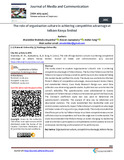The role of organisation culture in achieving competitive advantage at telkom Kenya limited

View/
Date
2022-09Author
Anyembe, Macktilder Makhoba
Bowen, Jeptepkeny
Sang, Hellen
Metadata
Show full item recordAbstract
This study aimed to explore organisational culture's role in achieving
competitive advantage in Telkom Kenya. The fact that Telkom was the first
Telecom Company in Kenya and yet its performance is low instead of being
the market leader justified this study. The study was anchored on Michael
Porter's theory of competitive advantage, resource-based review theory
and stakeholder theory. Case Study Research Design was used. Data
collection was done using questionnaires. A pilot test was used to test the
survey's reliability. The questionnaires were administered to twenty
employees of Telkom Kenya in Nakuru who were not part of the final study.
The Cronbach coefficient alpha test was used to determine the
questionnaire's reliability. The analysis of data was by inferential and
descriptive statistics. The study established that leadership style and
control system statistically impact Telkom Kenya's competitive advantage
with beta values of 0.243 and 0.230, respectively. The study concluded that
the efforts put so far by Telkom Kenya to achieve competitiveness are not
sufficient since its competitors still have the edge over it in the market. The
study recommended that Telkom Kenya consider changing its leadership
style to one that is participatory and implements control systems to ensure
continuous monitoring and evaluation of its performance.
Collections
- Publications 2019 [91]
